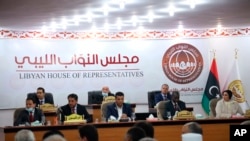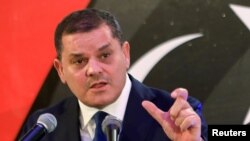Libya's parliament is going to vote on a new Prime Minister on Thursday, with just two of the seven declared candidates getting the OK to be on the ballot.
“Only two candidates submitted their papers in full, namely Fathi Bashagha, and Khaled al-Bibas. Five others submitted their papers incomplete," said Aqila Saleh, Speaker of the House of Representatives in the eastern city of Tobruk.
Libya was supposed to hold the election in December 2021. But the lack of consensus on the election' legal framework, the emergence of "controversial" candidates such as Saif al-Islam Gadhafi, and security conditions created a stalemate, leading Parliament to first postpone the election, and then, dismiss it altogether.
The current Prime Minister, Abdulhamid Dbeibeh, was appointed in February, 2021 through the Libyan Political Dialogue Forum, a body created in 2020 to help Libya regain its democratic functions.
Hurdles loom large
The parliament move is most likely to face disapproval by the High Council of State (HCS) in Tripoli which called for a consensus on a road map before discussing the amendment of the authority of the executive branch. “This political arrangement is not worth anything and is a leap in the air,” said HCS President Khalid al-Mishri during a news conference Sunday in Tripoli.
“We approved the parliament’s demand to change the government, but it is necessary to determine the constitutional path for the elections first,” he added.
Another hurdle is dealing with the militias, which are divided over the ousting of al-Dbeibah. Last week clashes erupted between rival militias in the capital Tripoli in the wake of parliament’s attempts to oust al-Dbeibah. About 33 loyalist militia leaders in Tripoli and Misrata, the most powerful military block in western Libya, have opposed the east-based parliament's decision.
“A new prime minister can only take over if he has at least the acceptance or even better the support of the major Misrata militias and of some of the more important militias from the capital Tripoli,” said Wolfgang Pusztai, former military attaché in Libya.
Since the incumbent PM al-Dbeibah and PM candidate Fathi Bashaga are both from the strong city Misrata, it’s unclear which side militias will take.
Who is likely to be Libya's next PM?
Unlike al-Bibas, who is a newcomer, Bashagha has many advantages in the contest as he previously served as an interior minister, and as apresidential candidate.
Most importantly, Bashagha gained greater political status after becoming the de facto strategic leader of the defense of Tripoli when General Khalifa Haftar attempted to take over the country.
Libyan analyst Kamel al-Mirash says despite a contest for the PM post, everyone wants the new government to succeed.
As for Bashagha's chance in the Thursday PM vote, al-Mirash told VOA "Bashagha has good relations with the U.S. and Turkey, and he can reassure them that he can resolve the issue in Tripoli, even if armed force is resorted to, which is unlikely."
Another move Bashagha made hailed by most of the parliament members was when he met Haftar seeking a compromise during the preparation of the now-postponed elections in December 2021.
But the success of any prime minister may well hinge on whether Libya's armed factions decide to back them.
“If the majority of the militias.. I would even call them kingmakers decide or agree that the Bashagha takes over, this will be the case,” Pusztai said.









